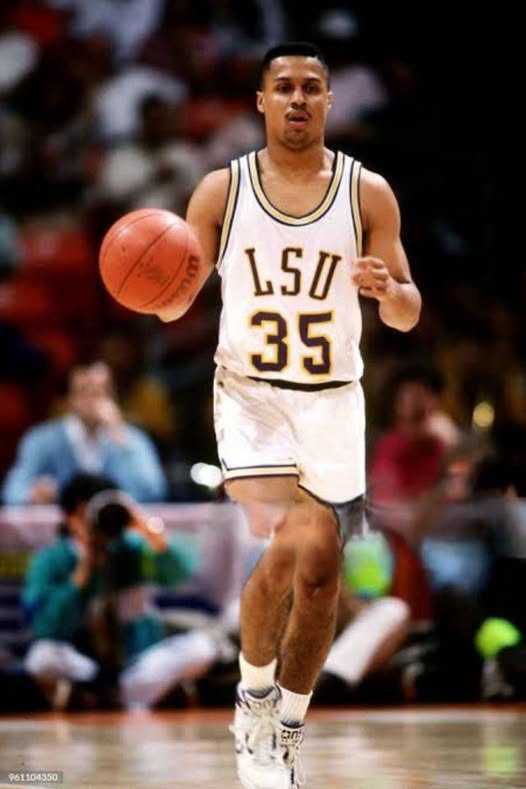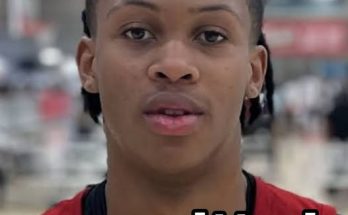In a landmark moment for the LSU Tigers men’s basketball program, the university announced the return of one of its most iconic players: Mahmoud Abdul-Rauf. The former LSU and NBA star has joined the Tigers’ staff as the team’s new Player Development Coach. This homecoming brings with it not only a wealth of basketball experience and knowledge, but also a deep emotional connection to the program that helped launch his storied career.
For LSU fans, the return of Abdul-Rauf—formerly known as Chris Jackson—is more than a nostalgic callback. It represents a commitment by head coach Matt McMahon and the LSU athletics department to reinvigorate the program with legacy, leadership, and lasting values.
A Welcome Return to Baton Rouge
Mahmoud Abdul-Rauf was once the heartbeat of LSU basketball. As Chris Jackson in the late 1980s, he dazzled college basketball fans with his lightning-quick release, electric scoring ability, and relentless competitiveness. Now, more than three decades after his final game in purple and gold, he returns not as a player, but as a mentor—one determined to help guide the next generation of Tigers toward greatness.
“I’m honored and grateful to come back to the university that shaped me,” Abdul-Rauf said in a press release. “LSU is where I became a man, a competitor, and a thinker. I want to help these young players develop not just as athletes, but as human beings. This is more than a job—it’s a calling.”
Head coach Matt McMahon echoed the excitement, calling Abdul-Rauf’s hiring a “monumental moment” for the program.
“Mahmoud brings an unmatched level of experience, intelligence, and competitive spirit to our staff,” McMahon said. “His presence will have an immediate and lasting impact on our players, both on and off the court.”
Revisiting a Legendary Collegiate Career
Before there was Steph Curry, before Allen Iverson shook defenders, there was Chris Jackson.
Abdul-Rauf burst onto the national scene during the 1988–89 season as a freshman at LSU. Despite being undersized at 6-foot-1 and dealing with Tourette syndrome, he averaged 30.2 points per game in his first year—still one of the highest freshman scoring averages in NCAA history. His ability to create space, knock down deep threes, and score at all three levels made him an instant superstar.
During his two seasons with the Tigers, Abdul-Rauf was a two-time consensus first-team All-American and a two-time SEC Player of the Year. He left college early for the NBA but remains one of LSU’s most beloved and respected alumni.
“He was a game-changer,” said Dale Brown, Abdul-Rauf’s former coach. “There’s never been anyone like him. What he did for LSU basketball can never be overstated.”
Now, Abdul-Rauf returns to the program not with a jump shot in hand, but with a treasure trove of wisdom to impart.
The Role: Player Development Coach
Abdul-Rauf’s official title may be Player Development Coach, but insiders suggest his role will encompass far more. While he won’t be one of the primary assistants recruiting off-campus or calling plays during games, he’ll have daily hands-on access to players during practice sessions, individual workouts, and film review.
“He’s here to mold habits, mindsets, and values,” said a source close to the program. “When Mahmoud speaks, players listen. He’s lived the battles, and that carries weight in the locker room.”
Abdul-Rauf’s emphasis will be on skill development—shooting mechanics, dribbling under pressure, offensive footwork, and basketball IQ—but he also plans to take a holistic approach to player growth.
“I want to help these young men understand discipline, focus, and purpose,” he explained. “Basketball is a vehicle, but character is what drives the engine.”
A Life Beyond Basketball
Mahmoud Abdul-Rauf’s journey from LSU to the NBA and beyond has been one marked by resilience, integrity, and defiance in the face of adversity.
Drafted third overall in the 1990 NBA Draft by the Denver Nuggets, Abdul-Rauf enjoyed a productive professional career. His best NBA season came in 1995–96, when he averaged 19.2 points and 6.8 assists per game, leading the Nuggets and drawing comparisons to the league’s elite guards.
But Abdul-Rauf made headlines off the court when he refused to stand for the national anthem, citing his Muslim faith and political convictions. His protest came two decades before Colin Kaepernick’s and cost him dearly. He was fined, benched, and ultimately blackballed from the NBA while still in his prime.
Despite the backlash, Abdul-Rauf never wavered.
“I stood for what I believed in,” he later said. “My conscience wouldn’t allow me to participate in something that contradicted my beliefs about justice and equality.”
His principled stance gained renewed appreciation in recent years, and Abdul-Rauf has since become a powerful voice for social justice and personal empowerment.
Impact on Recruiting and Culture
While Abdul-Rauf may not be hitting the recruiting trail himself, his presence is already generating buzz in recruiting circles. High school and AAU players know the name. More importantly, they recognize the story and what it represents.
“To have someone like Mahmoud Abdul-Rauf on staff sends a message,” said one SEC recruiting analyst. “It tells players that LSU values excellence, resilience, and legacy. That’s powerful.”
In an era where name, image, and likeness (NIL) deals dominate conversations, Abdul-Rauf’s addition offers a different kind of appeal: authenticity. Young players and their families are increasingly looking for mentors, not just marketers—and Abdul-Rauf fits that role perfectly.
“He’s walked the walk,” said McMahon. “He’s not about gimmicks. He’s about work, wisdom, and values. That’s the foundation we want at LSU.”
Embracing the Future, Honoring the Past
The timing of Abdul-Rauf’s return couldn’t be more significant. LSU basketball is at a crossroads, still striving to find consistency and postseason success after years of ups and downs. The arrival of a program legend who knows both glory and hardship offers a sense of continuity and direction.
In addition, LSU is reportedly working on a series of alumni-focused initiatives to further reconnect former players with the program. Abdul-Rauf is expected to play a key role in those efforts, helping bridge generational gaps and restore LSU’s proud basketball heritage.
“Bringing Mahmoud back is more than a hire—it’s a statement,” said an LSU athletic department official. “It’s a recognition that our history matters, and that our future is stronger when we honor our past.”
The Players’ Response
Current Tigers players were reportedly in awe when Abdul-Rauf walked into the practice facility for the first time as a member of the coaching staff.
“Everyone went silent,” one player said. “It’s like a legend just stepped out of a history book.”
Several players have already begun working with Abdul-Rauf during offseason drills, focusing on shooting form, footwork, and decision-making.
“He’s so detailed,” sophomore guard Tyrell Ward said. “He breaks the game down to the smallest movement. It’s crazy how much you can learn from him in just 30 minutes.”
Others noted the mental aspect Abdul-Rauf brings.
“He talks about mindset—being intentional, visualizing success, staying locked in,” said freshman point guard Curtis Knox. “He’s already changed the way I think about practice.”
LSU’s Long-Term Vision
Matt McMahon’s hiring of Abdul-Rauf fits into a broader vision for the LSU program: to build a sustainable winner grounded in principles. Since taking over, McMahon has emphasized development over short-term splashes and character over chaos. Abdul-Rauf is a natural extension of that philosophy.
“We’re building something that lasts,” McMahon said. “And you don’t do that by chasing trends. You do it by surrounding your players with greatness—real greatness. That’s what Mahmoud brings.”
LSU fans are equally energized. Social media lit up with tributes, highlights, and emotional messages after the announcement. The Pete Maravich Assembly Center is expected to see a spike in attendance this season—not just for games, but for practices and events involving Abdul-Rauf.
Mahmoud Abdul-Rauf’s return to LSU is a full-circle moment—one that blends legacy with purpose and past with promise.
He left Baton Rouge as a trailblazing teenager with a transcendent jump shot. He returns as a wise, battle-tested leader with a message and a mission. In doing so, he offers LSU basketball more than skills. He offers perspective, principle, and passion.
“I never stopped being a Tiger,” Abdul-Rauf said with a smile. “Now I’m just back where I belong.”
For LSU, for its players, and for fans around the world, the return of Mahmoud Abdul-Rauf is more than a feel-good story. It’s a turning point—and one that just might change everything.



